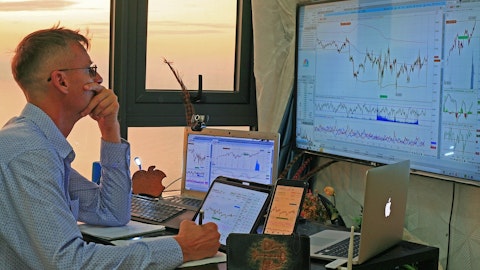And then in the hospitality segment, we’ll often see, opportunities for us to create more digital engagement with the guest by adding additional features into the application. So imagine the case, for example, and this is a real life example from one of our large hospitality customers, think about digital key. So instead of using plastic card, use the mobile phone to enter the door, that’s kind of a big area of investment for lots of these properties and we can control the digital front end of that key experience. So those are a couple of vectors. Anecdotally, I’ve seen a couple of accounts that have grown by roughly double within sort of a two, two and a half, three year time frame as a result of a couple of these phenomenons that I mentioned.
Howard Halpern: Okay. And then and then in terms of what the strategy is going forward in terms of direct sales versus using your channel partners. How should we look at that over the next year or two?
Mike Snavely: We’re going to continue to have a direct sales operation. In fact, I’m going to be bringing some of the old band back, who are instrumental in helping us drive to the $25 million number that I mentioned earlier on the call. These are people who really know how to sell. And so our direct sales operation will continue to be supported by account-based marketing, content marketing, really establishing ourselves as a thought leader and then getting our customers to tell their stories to the market as well. We will continue to invest in our relationships. And I mentioned Cox’s business and teams connect us to. There are a number of others, including, by the way, one of the largest, digital key providers in the world, actually, that have become a part of our partner ecosystem.
The number of deals that we have in the pipeline right now approximates a third of the pipeline from the standpoint of deal count. It represents more like 45% of the pipeline in terms of dollar volume. So, we’re finding that the channel deals, they come to us because of the synergy reasons that I described earlier and we are finding on average they are a little bit bigger than some of the directly source deals. So we’ll continue to invest in cultivating those channel relationships in addition to running our direct sales team. It’s a complex technical sale, which means that we’re providing a ton of support for the sale process to our partners irrespective and when they’re present in the deal. And so, we’ll continue to sort of intimate partnership at the deal level with those channel partners.
Howard Halpern: Okay. Well, thanks and look forward to the upcoming quarters.
Mike Snavely: Thanks so much. Appreciate the call.
Operator: [Operator Instructions]. We’ll take our next question from Ed Woo with Ascendiant Capital. Your line is open.
Ed Woo: Thank you for taking my question and welcome to Phunware again. My question is, it sounds like you’re targeting some bigger hospitality clients, so it looks like possibly bigger deals. Will it require a greater investment in the sales cycle as well as should we expect a sales cycle to kind of be extended as these deals appear to be bigger?
Mike Snavely: I think that’s a perfectly reasonable assumption. Let me let me speak to that a little bit. So we will continue the individual property rinse and repeat selling cycle. And I’m talking specifically about how hospitality healthcare is really kind of the same thing. In parallel with that. And so what I’m looking for is a little bit of an all the above strategy. And what I mean by that is, yes, we’ll sell individual properties but I want to bootstrap my way into, real conversations with the largest hotel brands in the world as we start to develop critical mass with their individual properties. And so imagine a case where we take an existing hotel loyalty app that has tens of millions of users. And we’re able to incorporate our location features, including the marketing and the wayfinding solution into that application.


